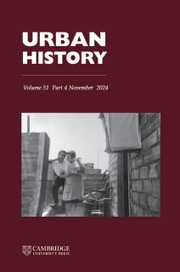Regular readers of the journal will not be accustomed to editorial statements, but recent developments have encouraged us to break with tradition. After 20 years Richard Rodger has stepped down, after being initially sole editor, and from 2002 joint editor of Urban History, though he remains an active presence on the editorial board. We want to acknowledge here his enormous contribution to the journal and the subject. It was Richard who oversaw the transformation of the journal from the Urban History Yearbook to its present format in 1992, and who has guided its course with such skill, imagination and attention to detail since then. Under his expert guidance the journal has led the field in urban history, becoming increasingly international in its scope and increasingly open to diverse interests and influences. A recent issue of the journal (34, 2 (2007)), for instance, has articles ranging from sixteenth-century Troyes to twentieth-century Tel Aviv and covers subjects from beachscapes to slaughterhouses. Another feature of the journal has always been the reviews of theses in urban history, the periodical reviews and the annual bibliography – all of which have contributed to the development of urban history as a distinctive field of study. Richard's enthusiasm for innovation led to the highly successful multi-media initiative, which was launched in 2005, with the help of Phil Ethington, our North American editor. As the current UK editors we are committed to maintaining the journal's international reputation as a forum for innovative and multi-disciplinary scholarship in urban history. On behalf of the urban history community we would like to thank Richard for his outstanding contribution over the last 20 years.
In keeping with the spirit of innovation we are pleased to announce the establishment of the Urban History Society. The Society has grown out of the work of the Urban History Group which has been in existence since the early 1990s. Its purpose is to bring together the diverse activities associated with urban history, to promote the subject internationally, and to represent it at a national level in the UK. We hope readers of Urban History will be among the first to join and to benefit from the reduced personal subscription rate which Cambridge University Press has kindly agreed to offer to members. Details of membership and rates can be found at http://www.le.ac.uk/urbhist.




